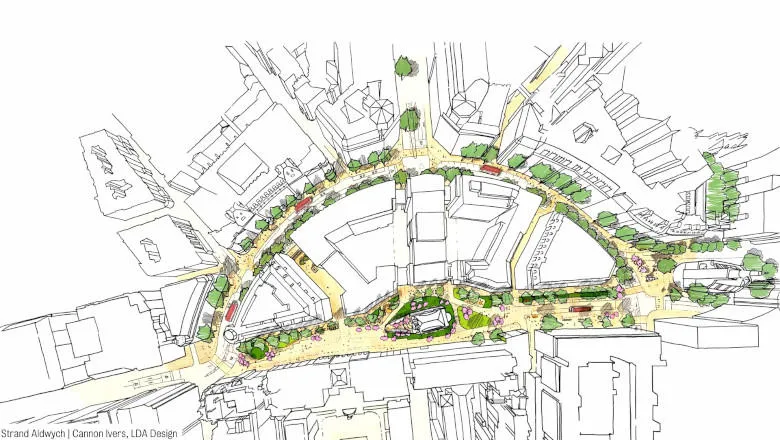Researchers are assessing the 'net impact' of a new pedestrianisation scheme in central London on air quality, traffic, noise and the local economy.

New analysis of the impact of removing traffic from a busy area of central London has revealed that traffic noise levels on the Strand are already a quarter of what they were before work on the scheme began.
As part of the project to track the 'net impact' of the Strand-Aldwych pedestrianisation scheme, King's researchers are working with Westminster Council to measure the effectiveness of the sustainability scheme, for both the local economy as well as the people in and around the area.
The project aims to learn from the scheme to optimise future investments and improve the urban environment in London and beyond. It involves measuring air quality, traffic and noise levels in the local area. In addition to this, the researchers are assessing the scheme's impacts on the local economy and jobs.
Prof Mark Mulligan, lead researcher on the project and an academic in the Department of Geography, said: "Pedestrianisation has many benefits but can lead to greater journey times, which are sometimes economically costly, as well as environmentally damaging. It's important that pedestrianisation has an overall positive impact – not one that improves one location or aspect of sustainability but leads to challenges elsewhere.
"Our focus is on learning from the Strand-Aldwych scheme to inform the project itself and similar urban improvement projects around the world."
He also referenced the importance of such schemes in supporting residents' health. Air pollution is a major cause of ill health globally. Indeed, the number of people dying early as a result of air pollution may exceed those killed by smoking. Moreover, noise pollution from transport creates an unpleasant environment and prolonged exposure to noise can also have major effects on people's health and wellbeing.
Cities can be a very unhealthy environment, particularly for the poorest and most marginalised, since the lowest cost accommodation tends to be closest to noisy, polluted roads where exposure to pollution can be continuous, day and night.– Professor Mark Mulligan, lead researcher on the project.
Led by Westminster Council, the StrandAldwych scheme involves a range of partners and and aims to transform the once polluted, traffic-dominated area of the Strand into a pedestrian-focused destination with strong links to the surrounding cultural centres such as Somerset House.
The north side of the former Strand-Aldwych gyratory system has already become a two-way road and all motor traffic has been removed from this section of the Strand to the south. With 22 AirPollution monitoring stations in an area of 3.5 hectares, Strand-Aldwych is now likely the most densely monitored urban area in the world.
Sensors can be seen on both King's and LSE buildings, and are measuring, among many things, noise pollution and the finest particles (PM1) that are rarely measured in other pollution studies.
Measurements began three months prior to pedestrianisation and will continue until 2024. They will tie into longer-term measurements provided by Westminster City Council. In the next stage, the researchers will deploy wearable sensors to map noise and air pollution throughout central London in relation to its impacts on measures of physiological stress for those wearing the sensors.
There are also plans to deploy more fixed monitors in the street to better understand small scale spatial variability in pollution exposure, to support the evidence base for urban traffic management elsewhere in London and beyond.
The analysis on the Strand-Aldwych area is part of a wider project looking to develop 'environmental intelligence' to inform and test greener investments that improve the environment whilst also benefiting economy and employment. Entitled, 'Restarting Economy in Support of Environment, through Technology (ReSET)', the wider project is funded by the European Innovation Council Future and Emerging Technologies programme and specifically looks at the environmental, economic and employment outcomes of a range of rural and urban green investments in the UK and Europe. This is in order to assess their effectiveness and learn lessons for the huge investments that will be needed as we transition to net zero.






